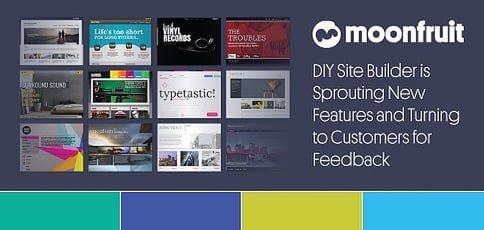
TL; DR: We cross the pond — virtually, of course — to explore the do-it-yourself website builder Moonfruit. The London-based company is modernizing and building new features to inspire self-sufficient, code-free websites that enable users to get online and share their passions with the world. Infusing customer feedback into the conversation, Moonfruit is rolling out new apps, responsive pages, and other updates — each one backed by an enthusiastic company culture. The company’s renewed focus on customer satisfaction resonated with Product Director Carla Dawkins, with whom we discussed Moonfruit’s exciting new trajectory.
Carla Dawkins has always enjoyed the culture behind creative web teams, technology consulting, and media groups — “it’s completely different from working at a bank,” she said with a laugh.
After hearing rave reviews about the company culture and enthusiasm, she joined site builder Moonfruit’s product team almost three years ago.
At Moonfruit, three Founders started with a vision of creating software that could present any small business or individual with an opportunity to easily build a website for free or for minimal cost. Having achieved that, Moonfruit expanded to offer templates, online stores, social media apps, and domain names.
Moonfruit restructured a year after Carla joined the team. She saw the company tighten their ranks — but also take a renewed focus on reaching out and involving their customers.
She now calls Moonfruit a “small and focused” team of about 30 people who are passionate about serving their customers. The leaner structure has been a better fit for Moonfruit, she said.
“We’re trying to get customers more involved in the conversation and have some more input on where the product develops in the future,” she said. “There’s only a couple of paces between support and development, so we can keep in touch with customer issues and feel that much closer to them. We’re constantly trying to focus on what key things our customers need, and experimenting with new ways in which we can develop solutions for that.”
Early Days: Moonfruit Founders Lay Foundation with Investments
Co-Founder Wendy Tan-White sketched out the idea for Moonfruit at her kitchen table in 1999, according to an article from The Independent. She and the other Co-Founders, her now-husband Joe White and best friend Eirik Pettersen, raised about £5 million (roughly $6.5 million) during the dot-com boom to get Moonfruit out of Wendy’s house and into the site builder fray.
More than 400,000 users signed up in the first six months, and the Founders switched Moonfruit from an advertiser-supported service to a company based on user subscriptions. The top UK website builder started turning a profit in 2004 and the team hasn’t looked back — since then, Moonfruit users have created more than five million websites and 230,000 stores, mostly in Europe and North America.
The Co-Founders sold Moonfruit to hibü, the digital services and online directory company behind Yellow Pages, for £18 million (upward of $23 million) in 2012. The Co-Founders also received up to £5.2 million (almost $7 million) in retention bonuses to work for hibü.
Site Builder at the Forefront of Moonfruit’s Services and Development
Moonfruit’s traditional-looking site builder feels familiar, like a word processor. All the regular tools are at your disposal, but a help menu is always on standby. There, you can find documentation, training videos, FAQs, and downloadable guides.

Moonfruit’s website builder (left) includes an online store (right), which integrates with Facebook and Twitter.
The builder features a drag-and-drop interface and the ability to start either from scratch or from a template. Social apps connect your site to your profiles, and you can further customize your site with video and audio players, as well as photo galleries.
“The whole premise is to try and give folks the ability to get online,” Carla said. “The ability to edit a site is quite powerful.”
New Apps Add Social Media Functionality
Carla and the Moonfruit team push out updates and new features every few weeks, if not weekly. Their focus lately concentrates around expanding the apps available to their users. Most apps focus on integrating social media channels and other features onto customers’ sites.
In addition to Google, Pinterest, and Instagram apps, Moonfruit has recently released apps that cover Spotify and Facebook and are working on apps for MailChimp, Wufoo, and Twitter.
“We have the foundations in place, which makes it easier to roll out apps,” Carla said. “We’re adding more and more through that.”
Responsive Pages Beta Test is the Beginning of Things to Come
Moonfruit’s current themes offer desktop and mobile versions, but the company released a beta test of responsive pages a few days after the apps update. Testers can currently only see and use a small part of the features that Moonfruit plans to release, according to Carla.
“We’ve got lots of ideas about where we can take responsive pages,” she said. “We’re slowly exposing these things to the customers and changing them based on the feedback we receive.”
Moonfruit Caters to Customers with Subscriptions and Support
Moonfruit caters to a large group of customers, ranging from individuals to small-to-medium businesses looking to showcase their creative interests, passions, or products. With a spotlight on involving customers and including their feedback in development decisions, Carla said Moonfruit deeply cares about meeting their product and support needs.

The Moonfruit team uses customer feedback to help drive the development of new features.
“People can build a broad range of sites that are applicable and relevant, whether they sell handmade crafts, have a blog, or are maybe looking to use us for a portfolio site,” she said. “We have a real mixture of customers.”
Subscriptions Enable Users to Add the Features They Want
Subscriptions to Moonfruit range from $4.50 per month to $35 per month, depending on which of the four plans you select and how frequently you’d like to make payments.
“Our customers haven’t got huge budgets to spend on web platforms, so they can come to us because they can get the job done for a fair price,” she said. “We give them a fair number of options to see what they may feel comfortable committing to.”
Customers with paid subscriptions can connect their own domain names or get credits toward free domains (Moonfruit also sells domain names, mostly for $15.99). Subscribers generally have more control over their site: they can remove Moonfruit branding, get more storage space and bandwidth, or sell more products in their store.
Support Systems Empower Users to be Self-Sufficient
With the DIY nature of the platform, Moonfruit tries to empower users to help themselves. Their robust help center covers everything from domains to SEO. Email support is available to paying customers, and phone support is reserved for higher-tier subscribers.
“We really do try to promote people being able to help themselves by using our online support site,” Carla said.
Moonfruit Customers Inspire Collaborative Work Environment
When Carla joined the Moonfruit team, she said she was struck by the team’s “ability to go places and do things and actually get stuff done.” Over the last few years, that has meant countless updates, added features, and more ways to provide for their customers.
“There are always things we’re doing to Moonfruit.com — improving our self-service areas, and bidding on domain offerings — but in terms of the product, it’s all about apps and responsive pages,” she said.
With a streamlined, integrated team, Carla finds herself and colleagues become immersed in multiple parts of the business — all in the name of caring for customers and advancing the Moonfruit product.
“We’re not very hierarchical here,” Carla said. “Anyone who has a good idea can have a voice. Some people are closer to the customers than others, and an idea can come from anywhere.”
HostingAdvice.com is a free online resource that offers valuable content and comparison services to users. To keep this resource 100% free, we receive compensation from many of the offers listed on the site. Along with key review factors, this compensation may impact how and where products appear across the site (including, for example, the order in which they appear). HostingAdvice.com does not include the entire universe of available offers. Editorial opinions expressed on the site are strictly our own and are not provided, endorsed, or approved by advertisers.
Our site is committed to publishing independent, accurate content guided by strict editorial guidelines. Before articles and reviews are published on our site, they undergo a thorough review process performed by a team of independent editors and subject-matter experts to ensure the content’s accuracy, timeliness, and impartiality. Our editorial team is separate and independent of our site’s advertisers, and the opinions they express on our site are their own. To read more about our team members and their editorial backgrounds, please visit our site’s About page.

